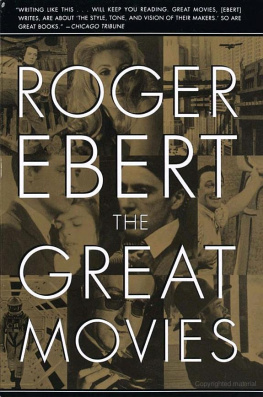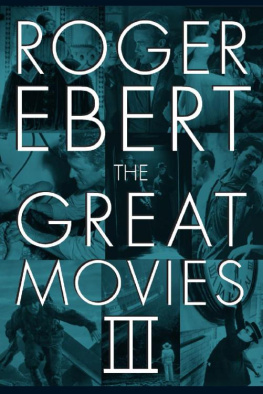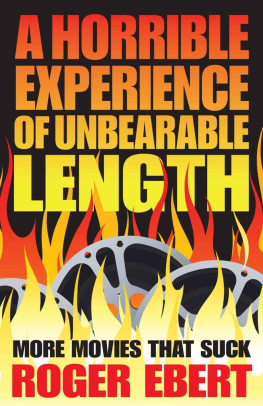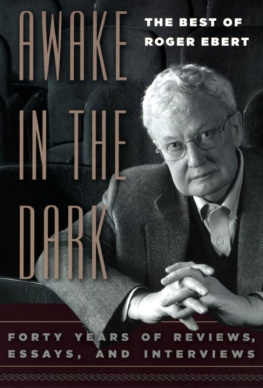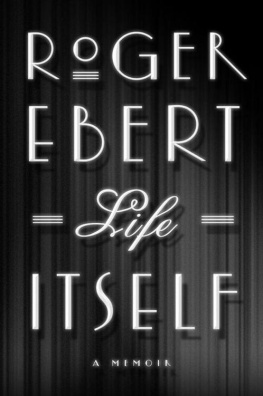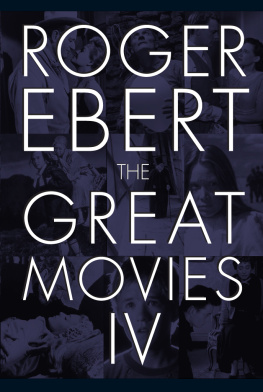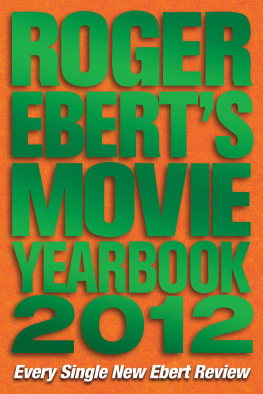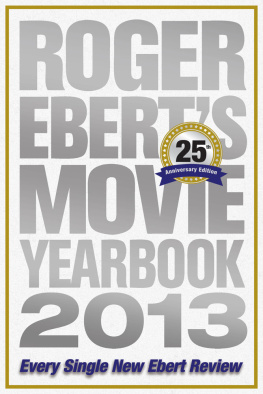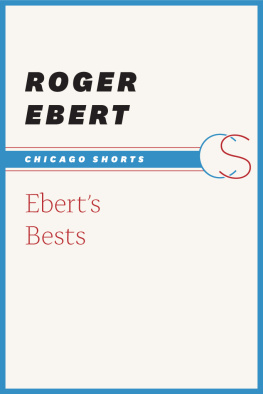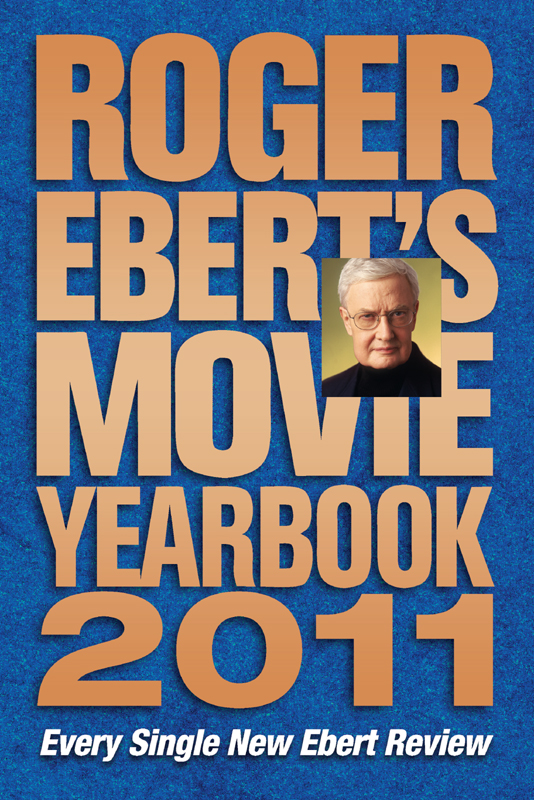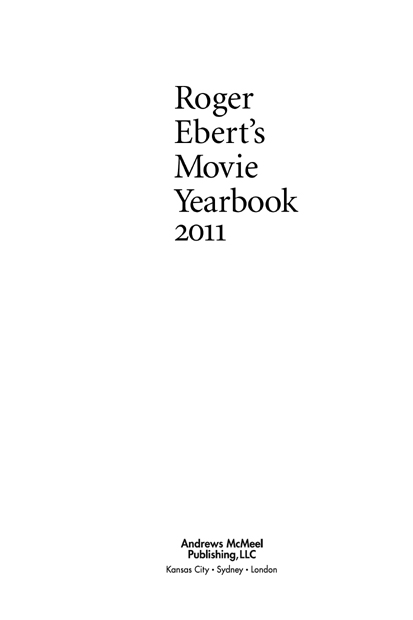This book is dedicated
to Robert Zonka, 1928-1985.
God love ya.
Roger Eberts
Movie Yearbook
2011
Other Books by Roger Ebert
An Illini Century
A Kiss Is Still a Kiss
Two Weeks in the Midday Sun:
A Cannes Notebook
Behind the Phantoms Mask
Roger Eberts Little Movie Glossary
Roger Eberts Movie Home Companion?
annually 1986-1993
Roger Eberts Video Companion
annually 1994-1998
Roger Eberts Movie Yearbook
annually 1999-2007, 2009
Questions for the Movie Answer Man
Roger Eberts Book of Film: An Anthology
Eberts Bigger Little Movie Glossary
I Hated, Hated, Hated This Movie
The Great Movies
The Great Movies II
Your Movie Sucks
Roger Eberts Four-Star Reviews1967-2007
Awake in the Dark: The Best of Roger Ebert
Scorsese by Ebert
With Daniel Curley
The Perfect London Walk
With Gene Siskel
The Future of the Movies: Interviews with Martin Scorsese,
Steven Spielberg, and George Lucas
DVD Commentary Tracks
Citizen Kane
Dark City
Casablanca
Floating Weeds
Crumb
Beyond the Valley of the Dolls
Contents
Introduction
In the most basic terms, it will give me pleasure to hold this Yearbook in my hands, because it will have the traditional heft of thirty months of reviews and other writings. Last years edition, you may have noticed, was thinner, and one year was replaced altogether by Roger Eberts Four-Star Reviews. My patient publishers were seeing me through that period of surgery and complications. With this 2011 edition Im back in full production, and that feels good.
Actually, Im writing more than ever, partly because I have more time. My troubles have narrowed my focus. I go to the movies, or watch DVDs on demand or Netflix Instant at home, write reviews, and write for my blog. Not being able to speak or eat limits your social life wonderfully. Im not complaining. Im happy to be alive.
What I realize now, more than ever, is what a useful social art the movies are. Most people probably go simply for entertainment, and theres nothing wrong with that. In the most basic sense, thats what movies are for. But they are also windows into other lives, and they can make our ideas less narrow. Because of movies, I know more about people in other lands. People in those lands know more about me. Those who limit themselves to special-effects extravaganzas know little about others and learn little about themselves.
Movies can help us look more intensely and notice more carefully. One way they do that is by encouraging us to look at the way the movies are made. A director who is any good is likely to see things in a very particular way, and if we notice that way, it helps us understand how that man or woman sees the world. If we dont noticeif we relate only on a superficial levelwe maybe wasting our time.
Two movies like that are reviewed in this volume: The Hurt Locker and Knowing. One took the Academy Award for the years best film. The other didnt. Both were on my list of the years best films. I received a great deal of negative feedback for liking both of those movies. There were a lot of people who hated them. For praising The Hurt Locker I was accused of being too highbrow, and for praising Knowing it was said I was too lowbrow. I dont believe I was either. I believe those who liked either film saw qualities others overlooked.
The strength of The Hurt Locker is in its meticulous construction. Without a single computer-generated special effect, it creates suspense other films can only envy. It does that with character and situation, so that we care, and editing, so that we care even more because we are forced into situations with the characters. Then theres the conflict between the bomb-disposal expert and his team, who think he takes crazy chances with his life and their own. Why didnt people admire this? Some cited actual bomb-disposal experts to say it was inaccurate. Im usually not much moved by that sort of complaint. If a film convinces me of its own premises, thats enough to allow me to accept it on its terms. A bomb-disposal expert is going to be looking at The Hurt Locker with eyes that will never be mine. It can be fatal to know too much about a movies subject. It was Truffaut who said we can never enjoy a film shot in our own childhood home, because thats all wed be thinking about.
Others were looking for the usual sorts of war-movie action and missed it. I find action essentially boring. Something explodes. So what? Car chases are exercises in several basic kinds of shots edited together with more or less skill. Only when a movie joins action and personality does it involve me. Its not what the protagonist is doing, but why.
Knowing, on the other hand, was an utterly preposterous film involving a prescient child, aliens or angels from somewhere else, and the possibility that all existence is predetermined. Wow, did it have holes and paradoxes in its plot, and I heard about them in great detail. I remained unmoved. Knowing was a film I loved for its energy and style, and its confidence to hurtle through a plot that was not merely preposterous but somehow intellectually challenging. It depended on ideas. You dont have to believe in an idea to enjoy thinking about it. I dont believe in predestination. But it creates fascinating possibilities for logical speculation.
And no matter what I may think about routine special effects (planets exploding and boring stuff like that), good ones can astonish. There has never been an airplane crash like the one in Knowing. Not in scope, not on realism, not in the way it all seemed to unfold in one shot. Never. I was stunned.
Those who are able to regard a film on its own terms can accept or dislike it. Those who are looking for a different film should have gone to see that one instead. Movie critics have been accused of being jaded because weve seen too many movies. Maybe so. If a film is merely a rearrangement of basic formulas, whats the point? If a director sees things in a new way, I am excited to see with him. With some so-called great directors, I fail, and I realize I must have areas of blindness. But at least I am willing to look.
Now that my mobility and speech are limited, I depend more than ever on movies to open up my life. Like the hero of Walker Percys The Moviegoer, I suspect that some of the most indelible experiences of my life happened at the movies.

My sincere gratitude to Dorothy OBrien, who has been the books valued editor at Andrews McMeel Publishing in recent years. Also to Sue Roush, my editor at Universal Uclick, and to Laura Emerick, Miriam Dinunzio, Darel Jevens, Teresa Budasi, Jeff Johnson, Chris Woldt, Thomas Conner, and all the other heroes at the Chicago Sun-Times, and Jim Emerson, John Barry, and the Web staff at rogerebert.com. Many others are thanked in the acknowledgments.
In 2010, the University of Chicago Press published The Great Movies III, continuing a series that gives me a lot of pleasure. And Andrews McMeel has published The Pot and How to Use It: The Romance and Mystery of the Rice Cooker, a rather unlikely book coming from me, which must mean I was compelled to use it. My Andrews McMeel book


